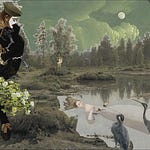XVIII. SUICIDEEn sa robe de lune blanche Pierrot rit son rire sanglant. Son geste ivre devient troublant : Il cuve le vin du dimanche.
Sur le sol traînaille sa manche ; Il plante un clou dans le mur blanc : En sa robe de lune blanche Pierrot rit son rire sanglant.
Il frétille comme une tanche,
Se passe au col un nœud coulant,
Repousse l’escabeau branlant,
Tire la langue, et se déhanche
En sa robe de lune blanche.
XVIII. SUICIDEIn his white robe made of moonlight Pierrot laughs his bloody laugh. His drunken gesture becomes disturbing: he sleeps off his Sunday wine.
His sleeve drags along the floor; he plants a nail in the white wall: in his white robe made of moonlight Pierrot laughs his bloody laugh.
He wriggles like a carp, puts a slip knot around his neck, kicks over the tottering footstool, sticks out his tongue, and lurches side to side in his white robe made of moonlight.
NOTES (by line number, starting with the title).
1 This is rondel VII, otherwise untitled, in Rondels Bergamasques. It continues the theme of hanging from rondels X and XVII.
4 troublant : According to Picoche, Latin turba, ‘agitation of a crowd’, later ‘riotous crowd’ or ‘mob’, is the etymon of French trouble (noun), troubler (verb), and « troublant » (adjective). There has been an article on troubler in every edition of DAf before the current one (where it is work in progress)
5 cuve le vin du dimanche : A cuve is a wine barrel; to cuver (wine) is to let it stay in the barrel, whence the idiom « Cuver son vin, Dormir, reposer après avoir bu avec excès ; ce qui dissipe ordinairement l’ivresse », ‘To keep one’s wine in the barrel, to sleep or rest after having drunken to excess; which ordinarily dissipates drunkenness’ (DAf1878). The Google/HathiTrust French-language corpus has only a few instances of « le vin du dimanche » other than that in this rondel; most imply that such wine is an unusual treat, but none appears to refer to sacramental wine, so Giraud is not necessarily indulging in anticlerical humor here.
9 rire sanglant : This rondel’s suicide is not bloody; is Pierrot looking ahead to the Roman suicide in XX?
10 frétille comme une tanche : DAf1878 defines frétiller as « Se remuer, s’agiter par des mouvements vifs et courts », ‘To wriggle oneself, to move oneself about with short, lively movements’, and provides as an example sentence « Cette carpe était bien en vie, elle frétille encore », ‘This carp used to be quite lively, it is still wriggling’. Since the « tanche » (‘tench’ in English) is in fact a kind of carp, I assume that it is known to anglers as particularly wriggly.
11 nœud coulant : Slip knots became disfavored for (official) executions by hanging, as they cause protracted, torturous death by strangulation rather than near-instantaneous, ‘merciful’ death by dislocation of the cervical vertebrae; but they are much easier to tie.
12 escabeau : « Siège de bois sans bras ni dossier », ‘Wooden seat with neither arms nor back’ (all editions of DAf).
branlant : Before 1935, DAf’s definition of branler is essentially that of DAf1878: as a transitive verb, « Agiter, mouvoir, remuer, faire aller deçà et delà », ‘Shake, move, stir, cause to go back and forth’; as an intransitive verb, « Être agité, osciller, pencher de côté et d’autre, faute de solidité », ‘To be agitated, to oscillate, to lean from side to side, to lack solidity’. In slang (at least as far back as 1835, see Landais), (se) branler = to masturbate (oneself). In context it does not seem unlikely that Giraud here alludes to autoerotic strangulation.
13 langue : See XIII.12, XXV.2, and XLIV.3.
se déhanche : After defining the reflexive verb se déhancher, DAf1878 adds the usage note « Il ne s’emploie qu’au figuré. Affecter une démarche molle et abandonnée. Cet homme se déhanche en marchant », ‘It is only used figuratively. To walk with an uneven gait, to lurch on one’s haunches.’










Share this post